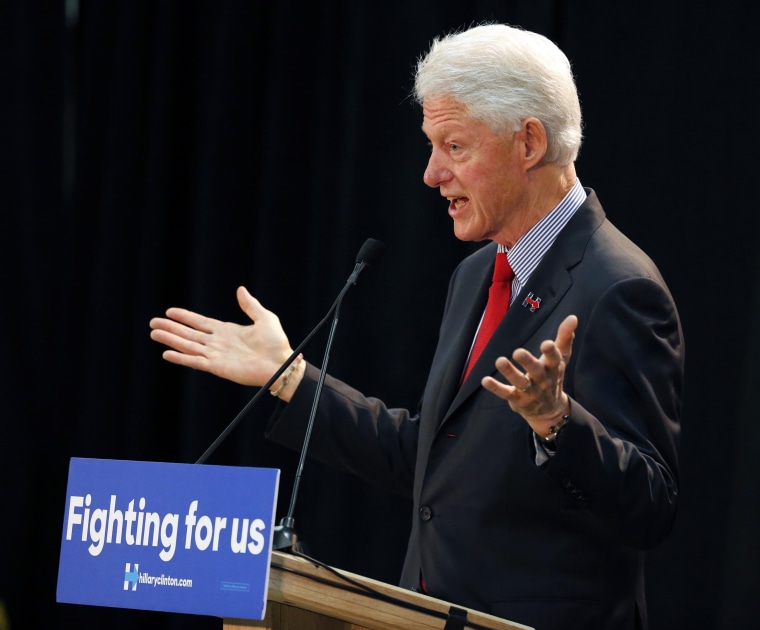Bill Clinton couldn’t serve in Hillary Clinton’s cabinet if she’s elected president, but he could have a powerful, less formal role in her administration, according to an MSNBC analysis of federal law governing the appointment of relatives.
Hillary Clinton this week said she would put her husband “in charge of revitalizing the economy,” especially in economically depressed areas, leading many to wonder what shape the former president’s role would take.
Ironically, Hillary Clinton’s role in her husband’s administration provides the best precedent for what the former president’s job might look like.
“I have asked, actually, to be given the job of trying to help every part of the United States that has been left out and left behind economically,” Bill Clinton said while campaigning for his wife in Puerto Rico Tuesday. “And I think it is very, very important.”
Presumptive Republican nominee Donald Trump slammed the idea. “How can Crooked Hillary put her husband in charge of the economy when he was responsible for NAFTA, the worst economic deal in U.S. history?” he said on Twitter.
And former Obama top adviser David Axelrod said it was “ill-advised” to make Bill Clinton economic “czar,” since voters expect the president to take the lead on an issue as important as the economy.
Hillary Clinton’s campaign said there has been no formal decision made on the former president’s role, pointing out that she has long said her husband would play an advisory role.
“She would certainly want his advice and counsel. It would be getting ahead of oneself to talk about any sort of formalized role for anyone in your administration,” said Clinton campaign spokesperson Nick Merrill.
Either way, this is virtually uncharted territory in the modern American presidency, raising important legal and governing equations.
First of all, Bill Clinton would not be able to serve in his wife’s cabinet, nor in an agency position, thanks to 1967 anti-nepotism statute. The law bars any public official, including the president, from appointing a relative “to a civilian position in the agency in which he is serving or over which he exercises jurisdiction or control.”
Of course, relatives of presidents have served in their administrations in the past, including most famously Bobby Kennedy serving as attorney general under his brother, John F. Kennedy. But that was before the anti-nepotism law has passed and those relatives have not been former presidents themselves.
While that plainly rules out a cabinet post or senior position in a federal agency controlled by the president, it doesn’t mean Bill Clinton wouldn’t be able to have a title.
While in office, the former president appointed his wife to chair his Health Reform Task Force, which spearheaded an ambitious health care reform effort. This was not a traditional executive appointment like a cabinet post, but the first lady exercised a real government role.
She chaired a working group that included some of the highest ranking members of the cabinet, like the secretaries of Defense Department and the Treasury, along with senior White House staff and the director of the powerful Office of Management and Budget.
That doesn’t mean there weren’t legal questions. Critics sued to block the creation of that task force, but the D.C. Circuit Court of Appeals cleared the path for Hillary Clinton to serve in a 1993 opinion.
The ruling largely sidestepped the larger issues, focusing on the arcane question of whether that particular type of task force triggered certain federal requirements, and finding it did not.
So if a president wanted to tap a family member for some kind of non-cabinet role, there is legal and governing precedent to do so. That said, it wouldn’t come without potential governing headaches.
First ladies often take on some kind of policy role, but Hillary Clinton’s larger role in her husband’s White House led to clashes with the chief of staff, agency heads and others.
Bill Clinton has been included in most of the campaign’s major decision making, according to aides, and presumably could be involved in major governing decisions as well. That could cause tensions with the vice president, as well other top advisers.


